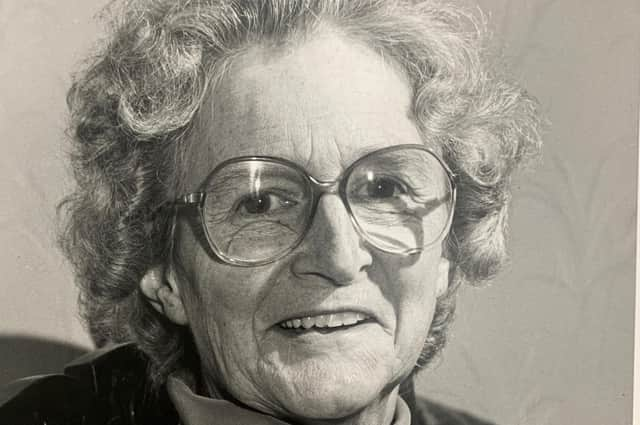Scotsman Obituaries: Pamela Epps, GP who pioneered treatment of people struggling with drug addiction


Faced with a deranged and suicidal knife-wielding drug addict, Pamela Epps deployed her customary no-nonsense approach: “You don’t really want to die do you? It would be an awfully messy business.”
Summoned by police at 2am, after the young man insisted she attend or he would kill himself, she sat alone with him as he pressed the large blade against his stomach. Slowly the amiable and empathetic GP gently talked him round and removed the weapon, much to the relief of police waiting anxiously in the hall.
Advertisement
Hide AdAdvertisement
Hide AdIt was one of several alarming incidents resulting from her decision to open her Edinburgh surgery to patients struggling with drug addiction – something she also did for HIV patients at a time when others were physically backing off – and a move she never regretted, although she always kept the telephone number of the local police station on her desk and didn’t hesitate to dial it.
“It was extremely hard work and on many days I was drained and exhausted,” she admitted in her autobiography, “but it could be very rewarding – not often I will admit, but sometimes. And, being quite selective with those I agreed to treat, I made many friends among them and they in their turn could be strangely protective towards me.”
Dealing with such difficulties was nothing new for Pamela Epps, or Dr White as she was then.
She had a core of steel and had already overcome hurdles that would have defeated a lesser woman: she had her first daughter while studying for her medical degree and later took on the health authority which had declined to let her run her own practice, concerned that her domestic arrangements would interfere with her professional commitments.
She appealed and won, single-handedly running a surgery for 25 years.
Pamela Anne Moncrieff was the seventh and youngest child of Lord James Moncreiff, the 4th Baron Moncreiff and his wife Lucy. She was born at Edenthorpe Hall, near Doncaster, and the family moved to their ancestral home, Tullibole Castle, Crook of Devon, Kinross, when she was five. Pamela’s childhood there, in the early 1930s, was idyllic. She and her youngest brother were able to run wild in the countryside and the house was always full of friends and siblings.
But by 1942 everything had changed: Pamela’s father died suddenly, her three brothers had gone to war and one of her sisters was widowed. As a teenager she found herself living alone in the castle with two widows. However, she threw herself into school work at Dollar Academy and went up to Edinburgh University a year early at the age of 17.
Her daughter Anne was born in 1946 and Pamela graduated MBChB in 1949, going on to work as a registrar in TB wards in Doncaster before returning to Edinburgh. She became Dr White in 1951 after marrying Edward White, with whom she had three more children, Nicolas, Vivienne and Douglas.
Advertisement
Hide AdAdvertisement
Hide AdDuring the 1950s she began working as a GP, assisting a doctor in the city’s Rankeillor Street, running the large practice single-handedly from 1964 when he became ill and later died.
When her subsequent application to take over the practice was rejected by the Scottish Home and Health Department, Pamela appealed. Unknown to her, more than 1,200 patients had signed a petition requesting she be given the practice.
She successfully argued her case “feeling a bit like Perry Mason” and believed she was the first woman doctor to win an appeal to the Scottish Medical Committee: “I feel it was a worthwhile battle to have won because I’m sure that the true reason I was turned down in the first place was that I was a woman.”
She and Edward divorced in 1972 and in 1979 she married Ernest Epps, buying a house on the shores of Loch Awe where she could escape the pressures of her ever-increasing workload.
During the 1970s Pamela trained as a hypnotherapist, using the therapy as part of her toolkit for psychological ailments. When the 1970s and 1980s saw the rise in drug abuse and the advent of Aids/HIV, she faced both issues head-on. Never judgmental, she was straight-talking and astute, developing her own strict system of care for addicts which won her praise from police, and taking on HIV patients others had turned away.
But her practice was time-consuming – she regularly worked 12-hour days – and treating those with drug addiction was a constant struggle, full of disappointments and only occasionally rewarding. “One thing I quickly learned was that coping with addicts requires constant firmness, patience and above all a sense of humour,” she said.
After running the practice single-handedly for a quarter of a century, she retired in 1989. Ernie had died suddenly a couple of years earlier but, accompanied by family, she returned to their cottage in Argyll every month for almost 33 years.
Another tradition Pamela kept up spectacularly during her life was attending the Edinburgh International Festival. Her mother took her to the first festival in 1947 and she never missed a year until she was into her nineties. She appeared on BBC Radio 4’s Front Row programme during the event’s 70th anniversary recalling, with enthusiasm and wit, some of the performers she had seen, who included Peter Cook and Dudley Moore, Alan Bennett, Kenneth Branagh, Emma Thompson and the “absolutely magical” ballerina Margot Fonteyn.
Advertisement
Hide AdAdvertisement
Hide AdPamela Epps is survived by her four children, four grandchildren, five great-grandchildren and a great-great granddaughter.
Obituaries
If you would like to submit an obituary (800-1000 words preferred, with jpeg image), or have a suggestion for a subject, contact [email protected]